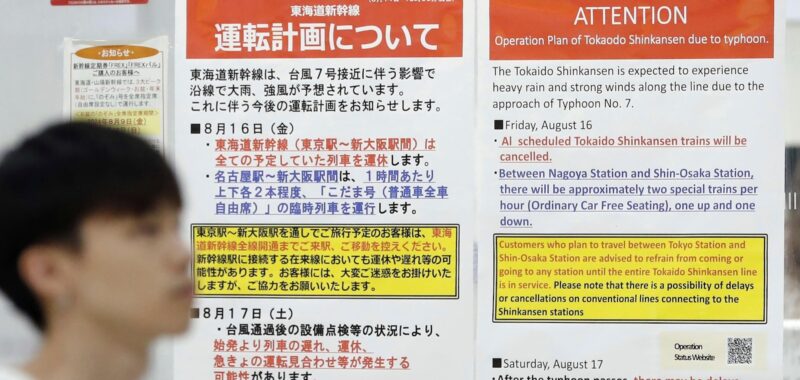Flights and trains in the Tokyo area have been canceled, and people were warned of strong winds, heavy rains and potential flooding and mudslides as a typhoon swerved near Japan on its way further north in the Pacific Ocean
TOKYO — Flights and trains in the Tokyo area were canceled Friday, and people were warned of strong winds, heavy rains and potential flooding and mudslides as a typhoon swerved near Japan on its way further north in the Pacific Ocean.
Typhoon Ampil was forecast to reach the waters near Tokyo in the evening then continue north, bringing stormy conditions to the northern Kanto and Tohoku regions early Saturday. It had sustained winds of 162 kph (101 mph) with higher gusts Friday morning and was moving north at 20 kph (12 mph), the Japan Meteorological Agency said. Ampil was not expected to make landfall and would weaken to a tropical storm by Sunday.
The Shinkansen bullet trains running between Tokyo and Nagoya were halted for the entire day, according to Central Japan Railway, a common response to typhoons here. Bullet trains serving northeastern Japan and some local Tokyo trains were suspended temporarily or switched to a slower schedule.
Dozens of departing and arriving flights were canceled at Tokyo’s two airports, Haneda and Narita, as well as at Kansai, Osaka and Chubu airports. The flight cancellations affect some 90,000 people, according to Japanese media reports. Several highways may also partly close to traffic.
Airports and train stations had been packed Thursday with people moving up their plans to avoid disruptions from the typhoon. Friday morning was drizzly and windy in Tokyo, and traffic and crowds out on the streets were sparse, mostly because of the Bon summer holiday period, not just the weather. Stores remained open.
Officials warned people to stay away from rivers and beaches and to be wary of winds strong enough to send objects flying.
“We foresee extremely fierce winds and extremely fierce seas,” said Shuichi Tachihara, JMA chief forecaster.
Japanese TV broadcasts showed Hachijo residents boarding up windows. Store shelves for bread and instant noodles were empty.
___
Yuri Kageyama is on X: https://x.com/yurikageyama

